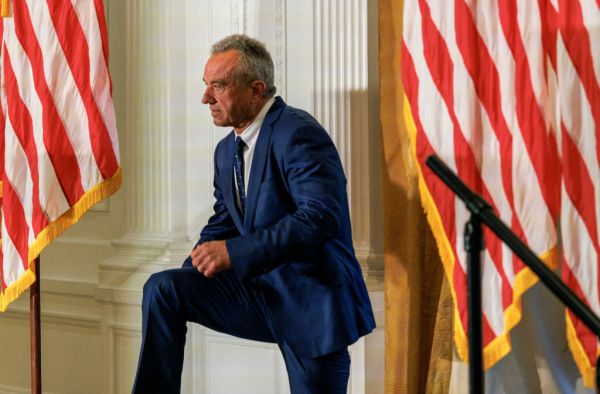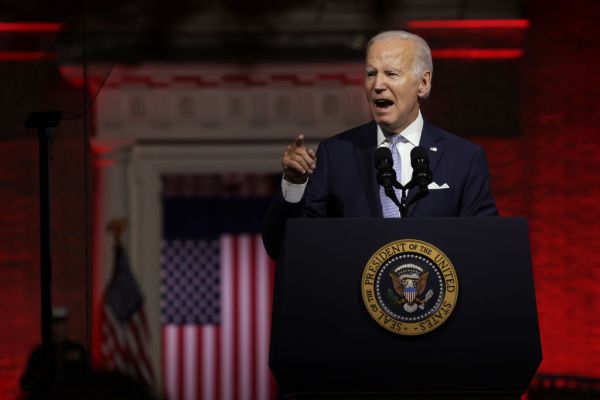Life is unpredictable, my friends.
One day you’re worried about foreigners “poisoning the blood” of the country, the next you’re stapling green cards to their American diplomas.
“The State Department estimated that the United States hosted roughly one million international students in the academic year that ended in 2022—a majority of whom came from China and India,” the New York Times noted in a story on Trump’s comments. That’s about equal to the number of immigrants in total who were granted permanent residency that same year.
Technically there’s no contradiction in building mass deportation camps for illegal migrants while vastly expanding green cards for those here legally, but … it’s a weird look for a populist demagogue. Especially one who didn’t spare legal immigrants from his efforts to reduce the national “blood-poisoning” during his first term as president.
And whose base normally isn’t prone to seeing special value in college graduates.
As news of Donald Trump’s apparent awakening on the virtues of highly skilled immigration spread last night, one of my editors messaged me to propose it as a topic for today’s newsletter. “What issue will Trump flip-flop on to his populist base’s chagrin next?” he wondered.
The thing is, this isn’t really a flip-flop. And the reaction among his base doesn’t quite reach the level of “chagrined.”
Note the date on this tweet:
At a primary debate in 2016, he was asked about the fact that his campaign website derided H-1B visas for skilled foreign labor as a threat that would “decimate American workers.” His response: “I’m changing. I’m changing. We need highly skilled people in this country, and if we can’t do it, we’ll get them in…. I’m softening the position because we have to have talented people in this country.”
That’s not how he ended up governing as president. During his term in office, he once described H-1B visas as a “theft of American prosperity.” But as a candidate, he’s paid lip service to letting American-educated foreign students stay put in the U.S. from the very beginning of his political career.
Which may help explain why, while it’s not hard to find grumbling on right-wing social media today, there’s no uproar over what Trump said. No one who was prepared to support him in November is threatening to withhold their vote in protest of his quasi-new position on foreign students. They’re used to this by now.
That’s because, as Trumpism has evolved over the last eight years, Republican expectations have evolved with it. In 2016 he prevailed in the primary by proving that the grassroots right would support populist conservatism without the conservatism. In 2024 he’s proving that it’ll support populism without the populism.
The splashiest policy plan to come out of the Trump campaign in the last few months was reportedly offered by the candidate himself in a private meeting last week with Republican senators. What if we replaced the federal income tax with tariffs, Trump proposed?
My colleagues Kevin Williamson and Scott Lincicome have since slashed that idea to bits as an economic and budgetary catastrophe, but it can’t be stressed enough how bizarre it is coming from a so-called populist like Trump. The tax system he imagines would be enormously regressive, crushing the lower and middle classes by grossly inflating the price of goods and services. The big winners would be the rich, who would see their 37 percent income tax burden vanish overnight.
Left-wing populism at least has some political logic to it in seeking to capture the wealth of the upper class via higher taxes and to redistribute that wealth below. Trump, the alleged working-class hero, is essentially thinking of doing the opposite—during a campaign dominated by the already high cost of goods and services, no less.
That’s not all. He told an audience of wealthy donors recently that extending the tax cuts he signed into law in 2017 will be a priority for him if he’s reelected. The rich would reap most of the windfall from that, with 40 percent of the benefits accruing to the top 5 percent of taxpayers according to one analysis. Some are understandably excited about it. Like, very excited.
Yet if there’s been any meaningful “chagrin” among right-wing populists over any of this, I’m unaware of it.
The closest thing to a truly populist economic idea Trump has offered lately was when he called for eliminating taxes on tips earned by service workers. That would benefit working class Americans, at least, but at the cost of blowing a new $250 billion hole in the federal budget over 10 years that might or might not be plugged with new taxes on less favored groups. Economist Brian Riedl was left counting the ways such a plan would be irresponsible: “It complicates the tax code. It induces income shifting (reclassify[ing wages] as tips). It serves no national purpose. It adds to the debt. These workers already pay almost no income taxes.”
There’s no economic logic to it—but there isn’t supposed to be. Trump introduced the plan at a rally in Nevada, not coincidentally, where he stands a real chance in November of flipping a reliably blue state. Making tips tax-free is, plain and simple, a blatant pander to the huge number of voters who work in Las Vegas’ hospitality industry. Bribing influential constituencies with indefensible tax breaks is as “principled” as Trumpy economic populism gets in 2024.
Again, though, there’s no evidence of the right feeling “chagrined” by it. On the contrary, a group of Republican senators (most of them up for reelection this year, unsurprisingly) celebrated Trump’s idea by hurriedly writing and introducing the “No Tax on Tips Act.” Among them was supposed fiscal conservative Ted Cruz.
This is what populism has become after eight years of Trump. Day by day, any ideological content it ever might have had has slowly drained away, replaced by the candidate’s personal political needs and hobby horses. Regressive taxes, payoffs to the rich, handouts to special interests, green cards for elite foreign workers coveted by corporate plutocrats—“populism” increasingly means whatever Trump wants rather than what “the forgotten man” needs.
There are other examples. Look at TikTok, which he once sought to ban as president because of the influence the Chinese government wields over its content. China hawkery is a hallmark of modern right-wing populism, yet Trump has since reversed himself on the ban even as Democrats have come around to his previous position. Maybe that’s because certain billionaire donors with a stake in the platform have whispered in his ear, or maybe it’s because he realized that protecting TikTok is fertile soil in which to grow his support with young voters.
Either way, Trumpy populism now means supporting TikTok. Don’t ask for it to make sense.
How about abortion? The pro-life position isn’t populist per se but a solid majority of the populist-in-chief’s party supports a federal abortion ban after 16 weeks of pregnancy. No matter: Despite the wishes of his voters, Trump has ruled out signing an outright ban and has repeatedly called for leaving the matter legislatively to the states. Lately he’s steered away from the topic entirely in public appearances, even before Christian groups. There’s chatter that the GOP platform might be tweaked to downplay abortion at this summer’s convention.
There’s no mystery as to why Trump is doing that and it has nothing to do with ideology. Many pro-life populists have been left “chagrined” by their leader’s reluctance to defend life with all the powers at his disposal, but once again, that chagrin seemingly hasn’t done anything to reduce his support.
With few exceptions, MAGA populism no longer means much of anything with respect to policy. Even Ukraine’s survival remains an important U.S. interest according to Trump, pitting him squarely against the post-liberal pro-Putin faction of his base. “Trump has given the GOP a Chomsky foreign policy, Gephardt trade policy, LBJ spending policy, and Clinton personal morality,” Riedl wrote on Wednesday. “Now, he has convinced GOP voters to support drastic, regressive tax hikes on themselves by calling them tariffs.”
What’s left of populism once most of the actual populism has withered away?
Another way of framing that question is this: To an unsettling degree, no one has any idea what a second Trump term will look like policy-wise.
Which seems insane. He’s been president for four years and on television yakking about politics for more or less every waking moment since 2015. By this point, we should know with crystal clarity what his agenda will look like over the next four. But apart from a concerted effort to deport illegal immigrants, we don’t.
The nature of the man is such that pinning him down on policy commitments is impossible. He’s a compulsive liar, for one thing. He’s also easily influenced by those around him: Any foreign-born college students dreaming today of a green card should remember that Stephen Miller will have his say on all this behind closed doors. Trump’s campaign has already partially walked back his statement, in fact, by clarifying that the green-card policy will “exclude all communists, radical Islamists, Hamas supporters, America haters, and public charges” and will apply only to the “most skilled graduates who can make significant contributions to America.”
I find it significant that he made his comment about granting permanent residency to college-educated immigrants on the podcast All-In, hosted by four mega-rich tech bros, two of whom recently held a fundraiser for him. Trump’s need to be liked by his audience has created in him a notorious habit of telling the people in a room with him what he thinks they want to hear. The All-In gang plainly wanted to hear that their industry’s access to skilled foreign tech workers will continue, so they did.
But once Trump has left the room, all bets are off. “Take him seriously, not literally,” we were told in 2016; eight years later, that’s code for “it’s anyone’s guess what he’ll do.” No wonder his fans aren’t bothered by his chatter about doling out green cards to foreign students. Why would anyone believe anything he says?
Other factors further complicate the task of trying to predict policy in his second term. Much depends, for instance, on whether Republicans regain control of both houses of Congress and, if they do, what their margins are. A 51-49 Senate in which moderates Susan Collins and Lisa Murkowski are the deciding votes looks very different from a 54-46 one in which they don’t matter.
Trump’s personnel choices also will carry unusual weight. Because he doesn’t hold firm views about most areas of policy, whether he chooses an establishment moderate or a radical populist to fill a given vacancy may come down to how much he personally likes them. Yet those choices will hold momentous consequences for how his administration operates: We could get drastically different policies on abortion medication, for instance, depending on who lands at the Food and Drug Administration.
We might see a constitutional showdown with Congress over executive budgetary authority, or not. Christian nationalism might fill the ideological vacuum in the White House left by populism, or not. Trump might be talked out of his insane idea of replacing the federal income tax with tariffs, or he might not. It all comes down to how nutty—or not—his menagerie of deputies ends up being, yet there’s no way to predict how they’ll be selected and which of them will have his ear.
Never has it been less certain which direction he’ll take in governing. And yet, across three election cycles, never has he polled higher in national surveys than he has at points this year. Why?
The answer, I think, is that Trump’s version of “populism without the populism” has made spite and retribution rather than policy the heart of Republican politics, just like the man himself keeps saying. And the American right is quite comfortable with a politics of spite and retribution.
Many of Trump’s supporters seem enthusiastic about it. Ask them if they’re more excited about replacing the federal income tax with tariffs or about prosecuting Manhattan District Attorney Alvin Bragg and what do you suppose they’d say? If you sat them down and explained that his economic policies will almost certainly deepen the agony they’ve experienced from inflation, how many would desert him?
In other countries, voters might lurch toward post-liberalism because there are certain policies they want implemented that normal politics can’t deliver. There’s always been an element of that in Trump’s support too (“build the wall!”), but over time the impulse to re-empower him has become less a means to an end among his fans than an end in itself. They want revenge on Democrats for winning the “rigged election” of 2020 and for daring to hold their man accountable for the crimes he’s committed, and only by reelecting him will they achieve that. Apart from a tighter southern border, there’s no particular policy they seek from an authoritarian Trump administration; what they desire is for him to have a free hand to persecute their enemies, “owning the libs” with the gloves off.
And they’re willing to make almost limitless compromises on policy toward that end.
Trump knows it too. Lately friendly interviewers like Sean Hannity have tried steering him toward a more forward-looking agenda during their conversations, but despite their best efforts he refuses to let go of revanchism. When Phil McGraw pressed him on forgiving his political enemies, Trump replied starkly, "Well, revenge does take time, I will say that. And sometimes revenge can be justified.”
How could the movement he leads have turned out any other way under his influence except as disinterested in policy and consumed by grievances, more intent on using political power to harm its enemies than to better its own lives?
The controversy happening right now over Louisiana’s new “Ten Commandments” law plays like a parody of modern Republican priorities. While Trump goes about dragging the party toward centrism on abortion, Christian populists are rejoicing over a symbolic gesture that almost certainly won’t survive constitutional scrutiny. Why? Because they know it’ll make Democrats mad for a little while. It’s revenge for the victory the left won decades ago when the Supreme Court ordered church and state to be separated in public institutions. Even if the new law doesn’t stand up, the libs have been owned temporarily.
Spite and retribution, nothing more or less. “How easily the base is distracted by shiny objects and how easily are the young jackasses of social media worked up to defend the shiny objects as wins when the things we could win and make permanent are snatched away by our own side’s political leaders,” Erick Erickson wrote on Friday in frustration about Louisiana. The cherry on the sundae was Trump himself celebrating the new law in a Truth Social post, as if his entire life hasn’t been dedicated to seeing how many commandments he can break in any given 24-hour period.
Here’s my prediction, then, for Trump’s otherwise unpredictable second term: Republicans who still care about policy will get just enough from him on the policies they care about to ensure their loyalty as he goes about doing the things he really wants to do in office.
Old-school conservatives like Mitch McConnell who are prepared to sacrifice classical liberalism for more tax cuts will get those tax cuts. Pro-lifers who require some federal restrictions on abortion in exchange for betraying the constitutional order will receive them. The tech bros at All-In who need an uptick in H-1B visas before they sign onto authoritarianism also will get their wish.
Policy will be traded for quiescence toward Trump’s attempts to consolidate power. As with the hospitality workers in Las Vegas, he’s going to bribe various right-wing stakeholders into looking the other way when he fires half the Justice Department or ignores a court order or directs U.S. soldiers to confront left-wing protesters. He’s a transactional guy, famously. And eight years of Republican politics have shown him that almost everyone has their price.
The only sure thing in a second Trump term is that there will be many constitutional crises and fewer “conservatives” than you might expect who have any moral qualms about them. It used to be that the parties broadly agreed on civic fundamentals but fought over policy; as Trump’s brand of populism veers leftward, increasingly the parties will agree on policy but fight over civic fundamentals.







Please note that we at The Dispatch hold ourselves, our work, and our commenters to a higher standard than other places on the internet. We welcome comments that foster genuine debate or discussion—including comments critical of us or our work—but responses that include ad hominem attacks on fellow Dispatch members or are intended to stoke fear and anger may be moderated.
With your membership, you only have the ability to comment on The Morning Dispatch articles. Consider upgrading to join the conversation everywhere.